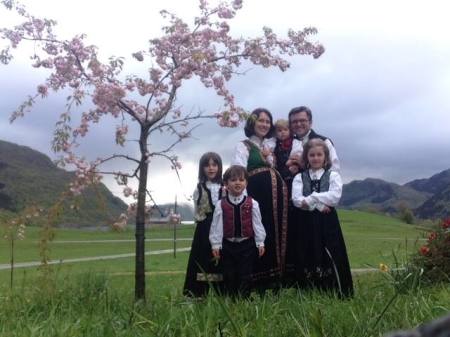5 Christian Kids Seized by Norwegian Gov't Over 'Spankings,' Not Family's Faith, Activist Says

The reason why five Romanian Pentecostal children were seized from their parents in November by Norwegian child services is because authorities used the fact that parents disciplined their children with spankings to charge them with child abuse, an activist close to the situation says.
Lawyer Peter Costea, the president of the Alliance for Romania's Families who has been in frequent communication with the family and its lawyers and has access to court records, told The Christian Post on Monday that court documents indicate that the five children of Ruth and Marius Bodnariu were taken from their parents' custody on Nov. 16, 2015, because the children told investigators that their parents spanked them as a disciplinary measure.
Costea explained that on Nov. 16, the Bodnariu's two daughters got into a fight on the bus while on the way to school and the oldest daughter was then questioned by the school's principal how they were being treated by the parents at home.
After the daughter explained that her parents used spankings to discipline her and her siblings, Costea, who is based in Texas, explained that the principal contacted authorities like she is legally obliged to do and told them about the spanking allegations.
Costea was informed by sources close to the matter that investigators from the Barnevernet (Norway's child service agency) asked the children leading questions in order to procure incriminating evidence against the parents, allowing the agency to remove the children from the home.
In a letter sent to Tove Bruvik Westberg, the Norwegian Ambassador to Romania, Costea wrote that Norway has violated the Bodnariu's parenting rights and added that the "punishment doesn't fit the crime."
"In our opinion, the reaction of the Norwegian authorities has been extremely subjective, an incredible display of totalitarian extremism. The Bodnariu family has been accused of spanking its children. Yet, the authorities translated this accusation into child abuse, which is farthest from the truth," Costea wrote. "Biological parents have the inherent right to reasonably discipline their children. The fact that Norway has banned corporal punishment of children does not mean that Norway is right in this matter and the rest of the world wrong."
Costea added that the disciplinary measures taken by the Bodnariu parents does not violate the United Nations Convention on the Rights of the Child.
"Though Norway might wish to be a step ahead of the convention in this regard, the convention does not give it the right to confiscate children from their biological parents," he wrote. "The reaction of the Norwegian authorities has been disproportionate to the improprieties that the Bodnariu parents are alleged to have committed. It has been irrational and extreme."
Costea told CP that neighbors and even the girls' principal have supplied testimonies stating that the Bodnariu parents are good parents. However, those testimonies have been ignored by Barnevernet investigators.
"The documents contain a lot of extenuating evidence or exculpatory evidence for the parents from neighbors, coming from the school principal, coming from the local municipality and all of that seems to have been absolutely ignored by the child welfare agency, which, in my mind, is absolutely major and a denial of due process," Costea said.
"The school principal lives almost next door, they live in the same neighborhood and she kept on saying,
'Look, the girls are normal, they are intelligent, they are developing well, and have never seen any abuse,'" Costea added. "'They have all they need to eat. They bring lunch to school everyday. I haven't seen any problems. The parents and the girls and the children play together and engage in various activities and I have never had any suspicions and I haven't seen anything.'"
Despite the testimonies in support of the Bodnariu parents, the children remain in three separate foster homes and the parents have limited visitation rights.
The Bodnariu family's next court hearing is scheduled for sometime in March. Although the family has claimed that the Barnevernet has initiated the adoption process for the children, Costea states that the authorities can't put the children up for adoption until the parental relationship has been completely severed.
"In March, they will have a hearing on whether or not to sever the parental relationship and they want the parents to be subjected to a psychological evaluation," Costea explained.
In an attempt to get the Norwegian authorities to release the children back to their parents, at least 10 members of the Romanian Parliament traveled to Oslo last week to meet with Norwegian authorities. However, Costea has not received word on whether an agreement has been reached.
Although it was initially reported that the principal called the authorities out of concern over the family's Christian faith, Costea states that such a claim is not accurate.
"The school principal actually did not, at least based upon what I know and have read, the school principal did not convey any concern about the religious beliefs of the family," Costea stated. "In Norway, teachers have the obligation to inform the authorities whenever school kids tell them 'Hey, my parents are spanking me or hitting me.'"
The Bodnariu family is not alone in their grievances with the Barnevernet. Costea contends that the Barnevernet has displayed a pattern of targeting migrant families.
"I have come across a whole bunch of documents, including a petition that was signed by parents from all over the world — Eastern Europe, Turkey, India, Polish, Czech, Lithuanian and so on — whose children have been seized by Norwegian authorities," Costea said. "The consensus of these migrants living in Norway is 'they are targeting us among others because they want our kids to grow up Norwegian.'"





















